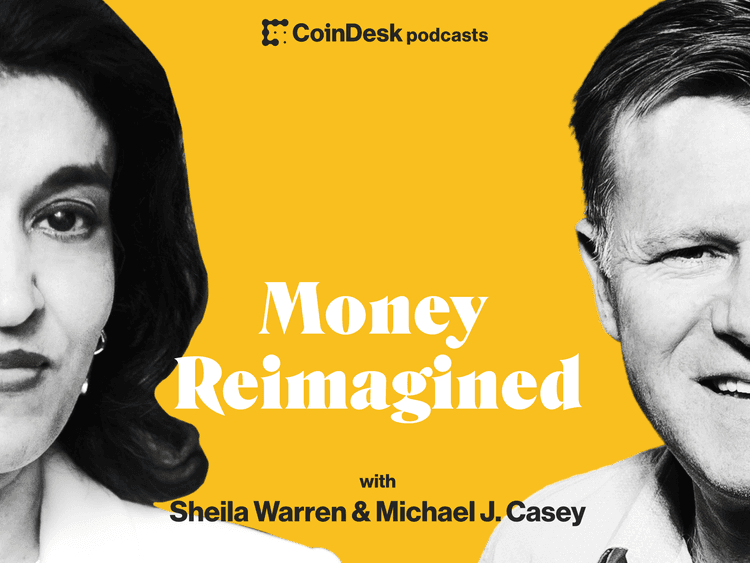Government Reimagined, With Jeff Saviano and Glen Weyl
In this episode of our Money Reimagined podcast, Sheila Warren and Michael Casey speak with two outside-the-box thinkers on their ideas for improving governance.
ABOUT
In this episode of our Money Reimagined podcast, Sheila Warren and Michael Casey speak with two outside-the-box thinkers on their ideas for improving government.
Quadratic voting and open auctions
One of our guests was Glen Weyl, the political economist and Principal Researcher at Microsoft Research New England, who co-authored the book “Radical Markets” with University of Chicago Law School professor Eric Posner. We chose to focus on just two of the many ideas that that book puts forward.
One is quadratic voting, which allows people not only to vote for or against a particular issue but to express how strongly they hold that view by buying extra votes – up to a certain limit of assigned credits. The cost in credits of each additional vote increases by a quadratic formula. It’s designed to help small groups of voters who care deeply about particular issues while still constraining them from overly skewing results.
Weyl has also worked on a variation of the concept with Ethereum founder Vitalik Buterin called quadratic funding, which in theory could diminish the influence of wealthy “whales” in voting systems that are based on financial holdings or contributions.
The second big idea we explored is that of perpetual open auctions. Here, every bit of property, including what we might otherwise think of as public property, is owned by private entities with the proviso that it is always up for auction and that the majority of the value created from it is shared equally among citizens as a social dividend.
Weyl and Posner argue that such an arrangement would incentivize owners to manage the property well, and that the wider distribution of wealth creation would give a greater number of people the wherewithal to start businesses. It would also be easier to develop land for infrastructure, such as high-speed rail lines, because the developer could easily acquire it.
Both of these ideas are rooted more in legal and process innovation than in software and distributed computing per se. But they intersect nicely with concepts associated with the crypto and blockchain space.
One is the potential for self-sovereign identity models to prevent people from gaming quadratic voting. Another is the potential enhancements that smart contracts, non-fungible token-based property, and decentralized finance (DeFi) concepts such as automated market-making might bring to open auctions. Also, quadratic funding might fix free-rider problems in blockchain projects, Buterin believes.
Government and smart taxation
Our other guest was Jeff Saviano, the global lead of tax innovation at EY. He is a member of the Prosperity Collaborative, within which organizations such as the World Bank, MIT Media Lab’s Connection Sciences lab and the New America Foundation are working with governments to improve transparency and efficiency in the collection and distribution of taxes.
Saviano talks of how blockchain-based tracing systems might not only give taxpayers a transparent view of how their taxes are being spent but also incorporate programmability.
For example, the actual, uniquely identified dollars that you contribute could be channeled directly and transparently into identifiable services that immediately benefit you and your community. Or, governments could use smart contracts to put hard constraints on those dollars, so only certain categories of expenditure, and not others, are enabled.
Read the rest of this weeks column here.
HOSTS
Michael J. Casey is Chairman of The Decentralized AI Society, former Chief Content Officer at CoinDesk and co-author of Our Biggest Fight: Reclaiming Liberty, Humanity, and Dignity in the Digital Age. Previously, Casey was the CEO of Streambed Media, a company he cofounded to develop provenance data for digital content. He was also a senior advisor at MIT Media Labs's Digital Currency Initiative and a senior lecturer at MIT Sloan School of Management. Prior to joining MIT, Casey spent 18 years at The Wall Street Journal, where his last position was as a senior columnist covering global economic affairs.
Casey has authored five books, including "The Age of Cryptocurrency: How Bitcoin and Digital Money are Challenging the Global Economic Order" and "The Truth Machine: The Blockchain and the Future of Everything," both co-authored with Paul Vigna.
Upon joining CoinDesk full time, Casey resigned from a variety of paid advisory positions. He maintains unpaid posts as an advisor to not-for-profit organizations, including MIT Media Lab's Digital Currency Initiative and The Deep Trust Alliance. He is a shareholder and non-executive chairman of Streambed Media.
Casey owns bitcoin.

EPISODES
Crypto's Future of Policy, Politics, and the Fight for a Pro-Crypto Government
Messari’s Ryan Selkis from Bitcoin to crypto policy.
Jun 14, 2024
Embracing Nuance and Logic | The Diverse Community of Crypto
Post-Consensus 2024 reflections and examining the crypto industry and the implications of the U.S. Presidential elect...
Jun 5, 2024
‘Tokenization Is the Future of Real Assets.’
Max Boonen, CEO, and Co-Founder PV01, shares the advancements in technology and the war over regulation for tokenizat...
May 22, 2024
Future-Proofing Finance: MICA, Crypto Disclosure, and Global Regulatory Challenges
Bluprynt CEO and Georgetown Law Professor, Christopher J Brummer highlights the crucial need for financial disclosure...
May 18, 2024

The Mining Pod
Feb 10, 2025

CoinDesk Podcast Network
The top stories and best shows in the blockchain world, delivered daily from the team at CoinDesk.
Dec 20, 2023

Markets Daily Crypto Roundup
Tune in as CoinDesk runs down daily action in bitcoin markets and some of the most important recent industry development.
Dec 19, 2023

Unchained
Unchained, your no hype resource for all things crypto by former Forbes senior editor Laura Shin, author of The Cryptopians.
Dec 18, 2023

